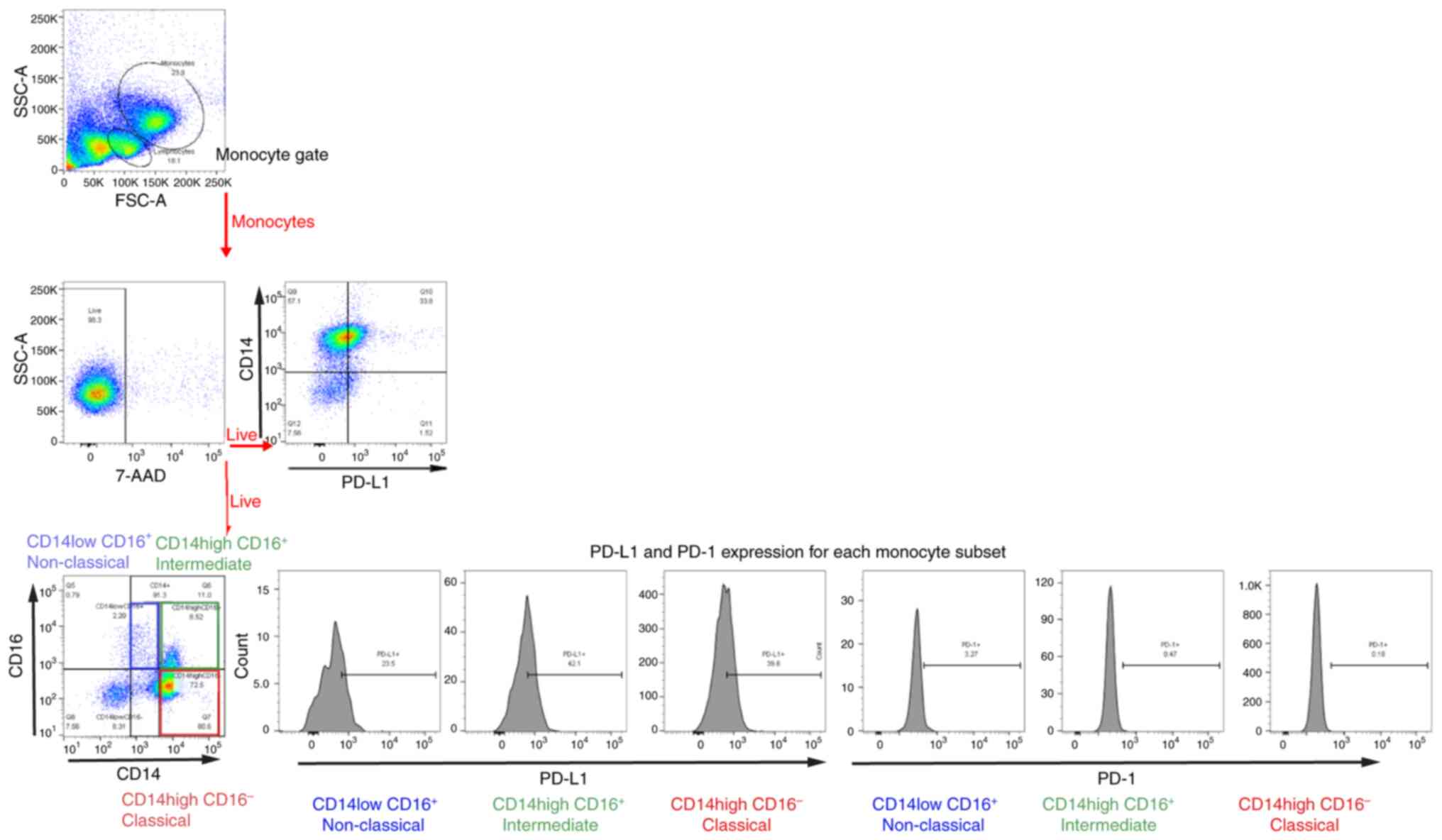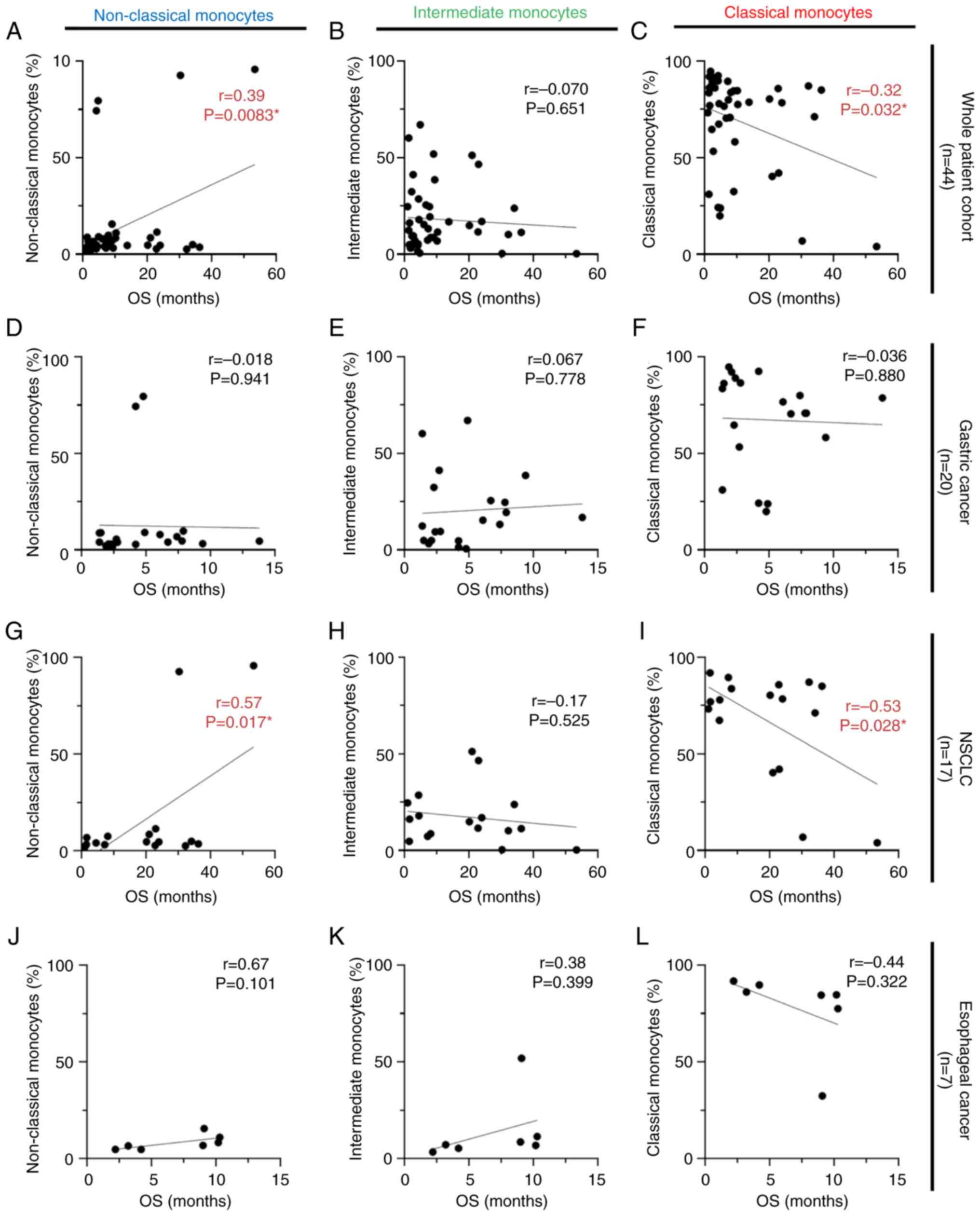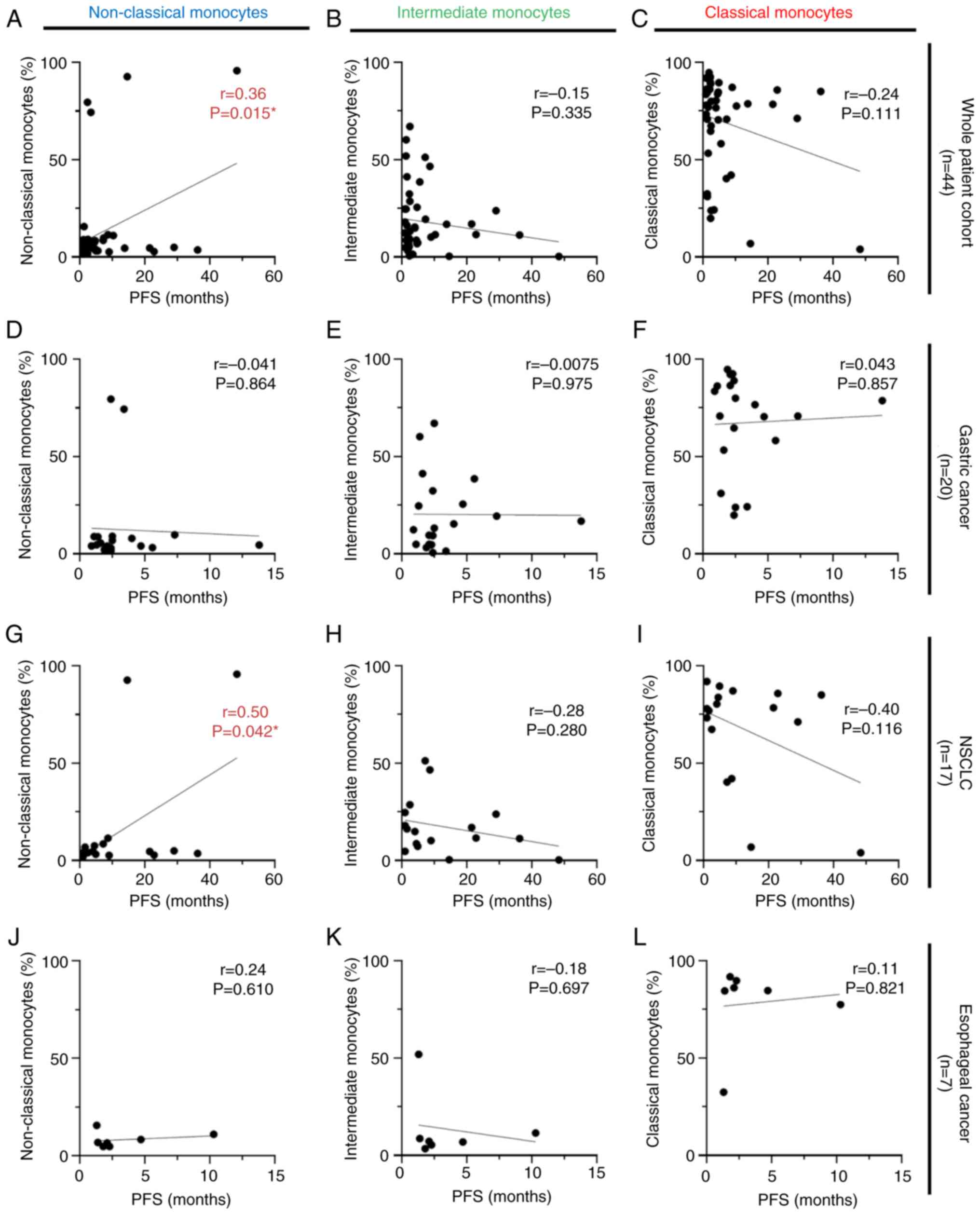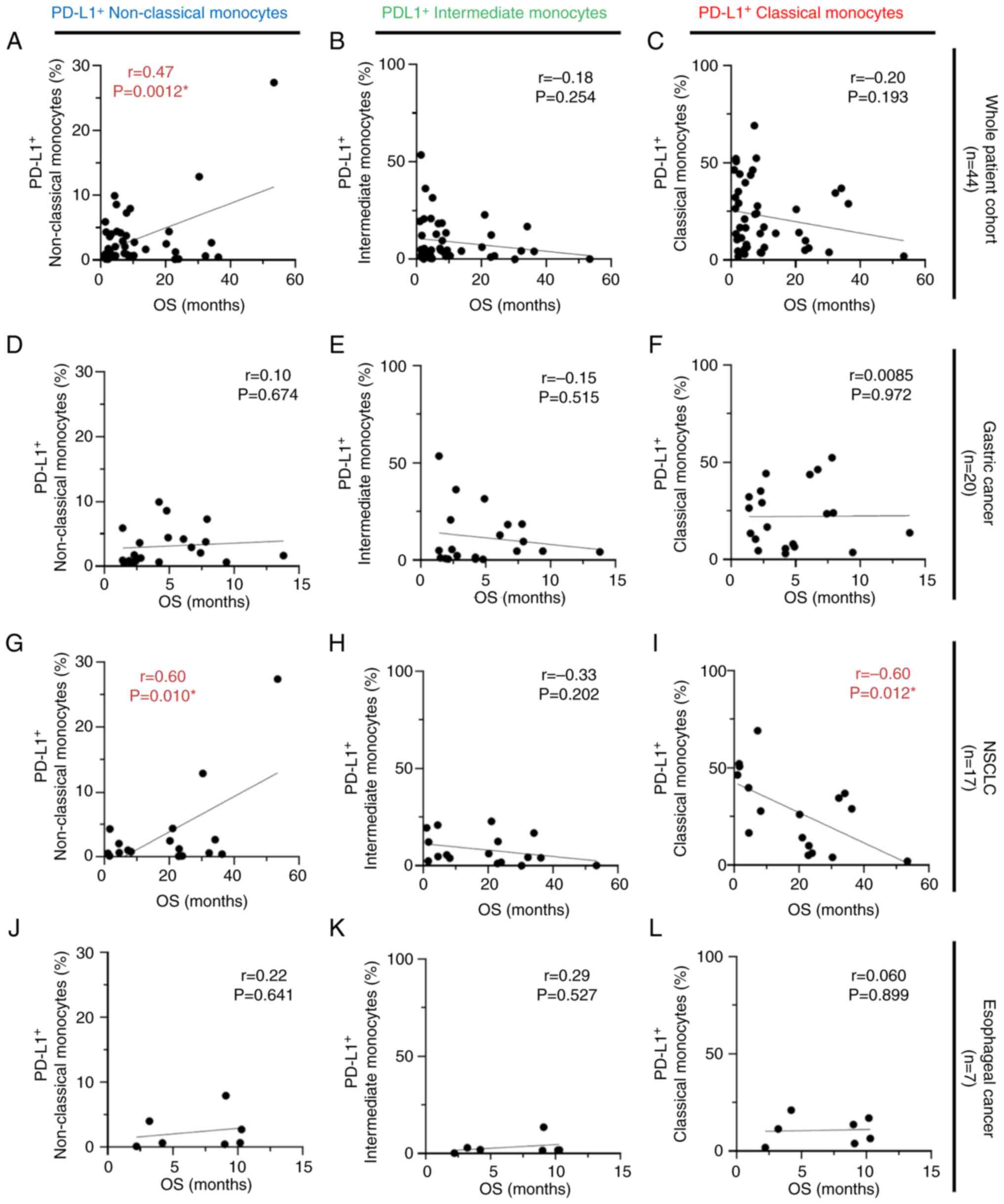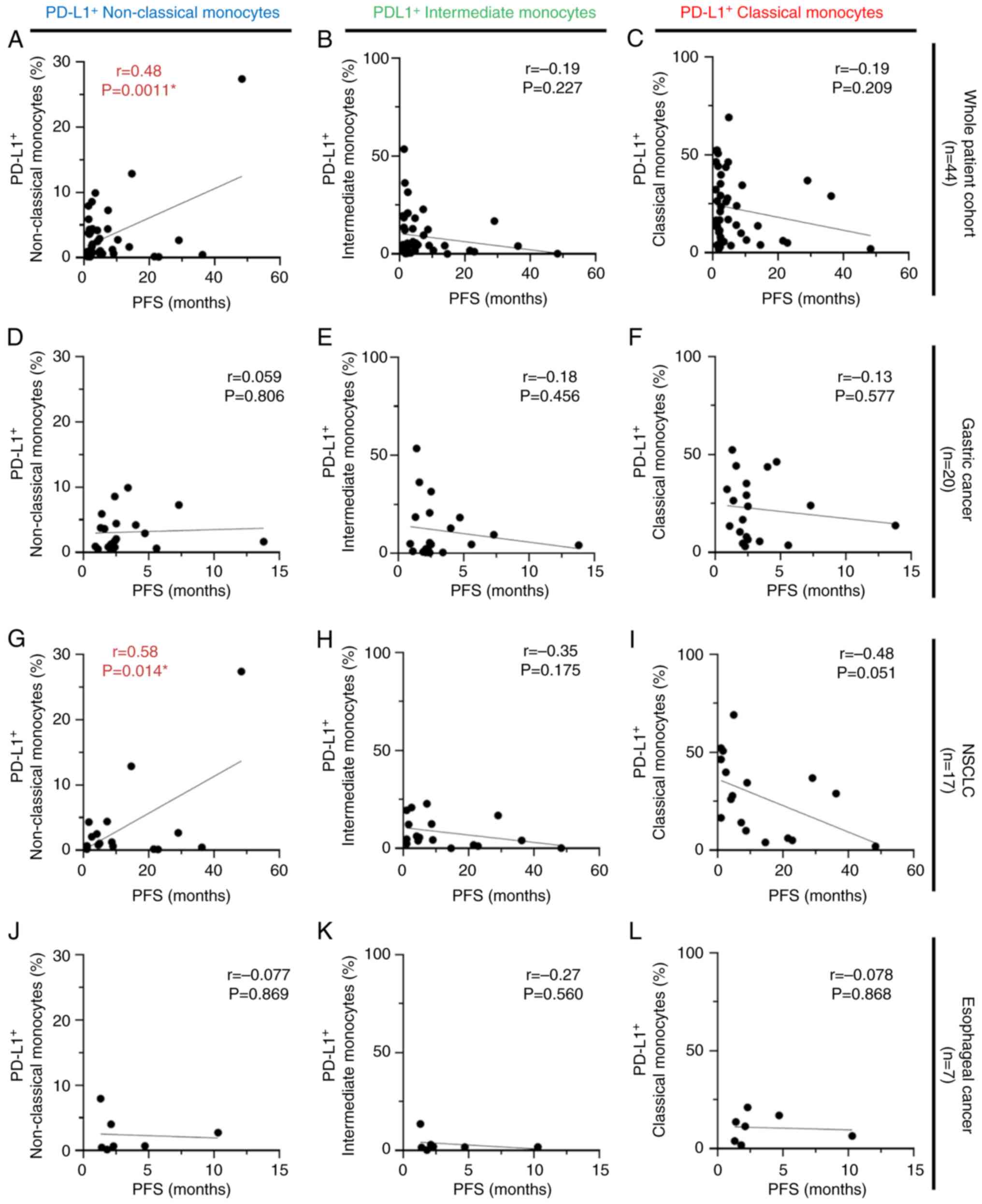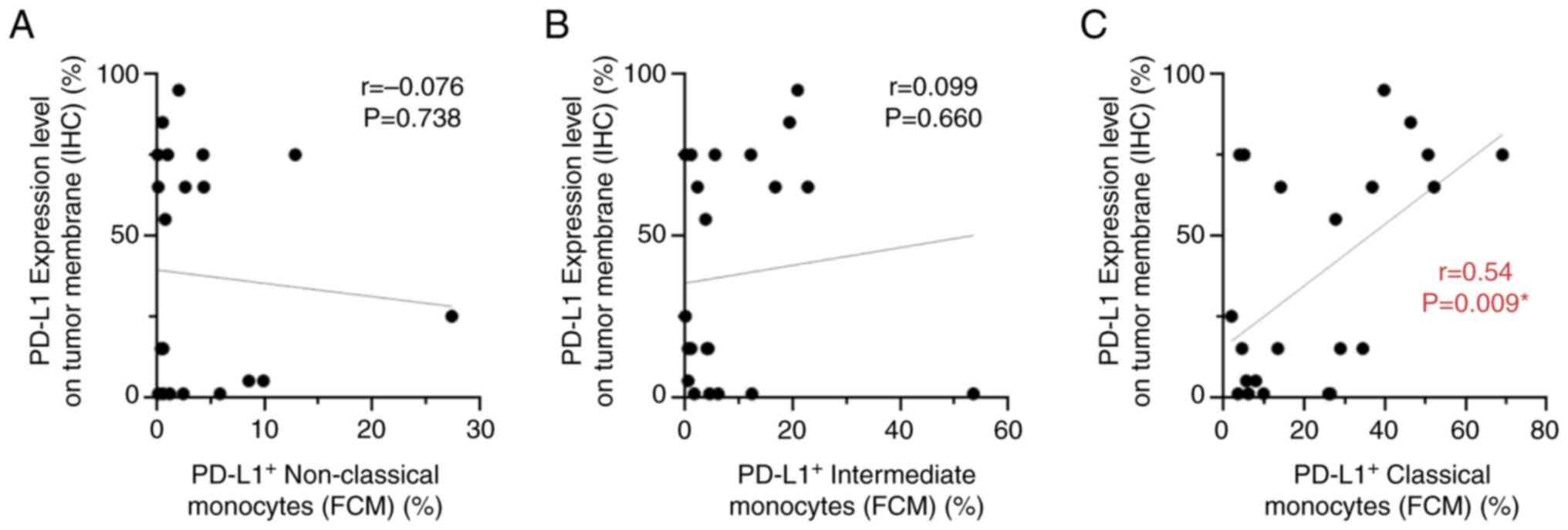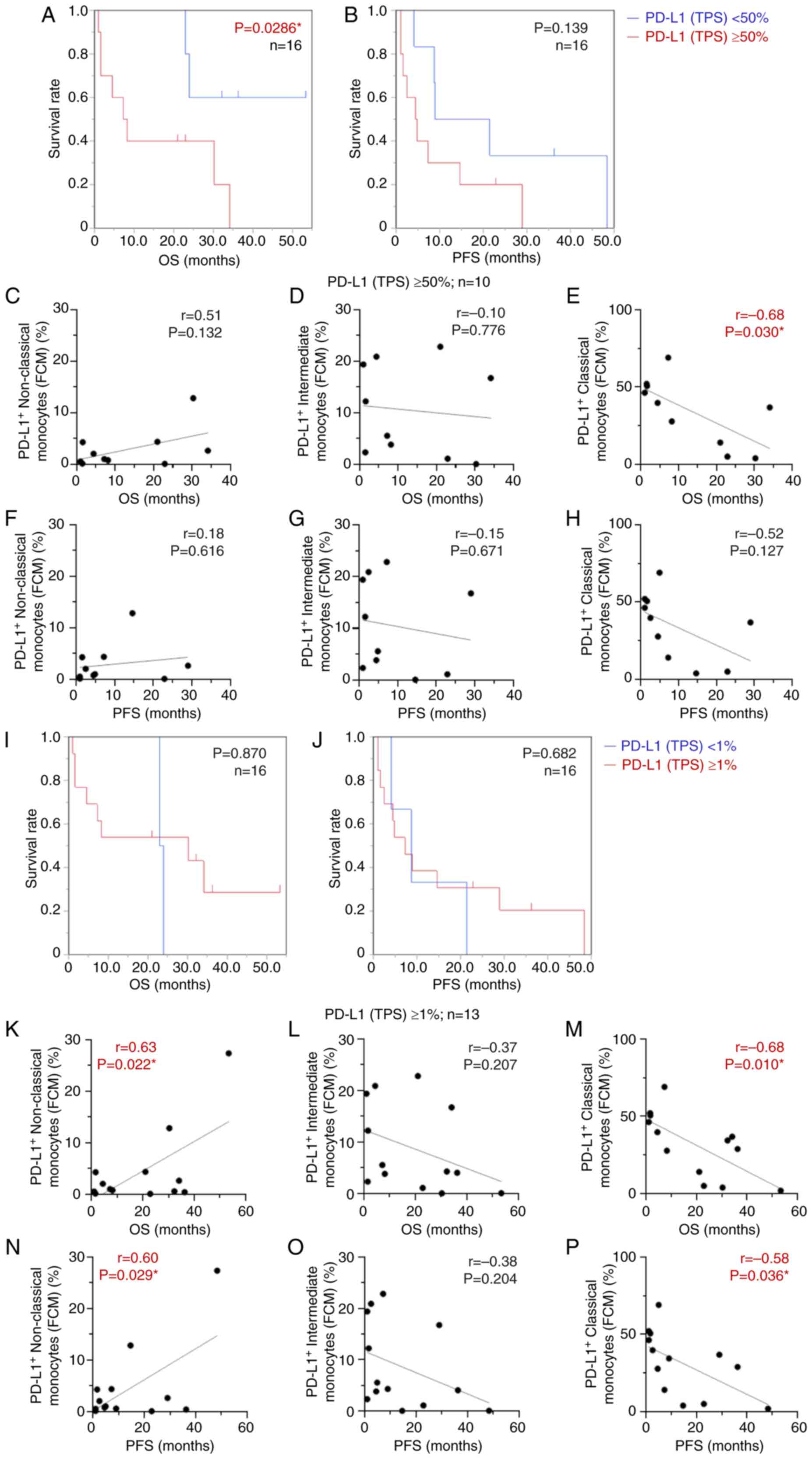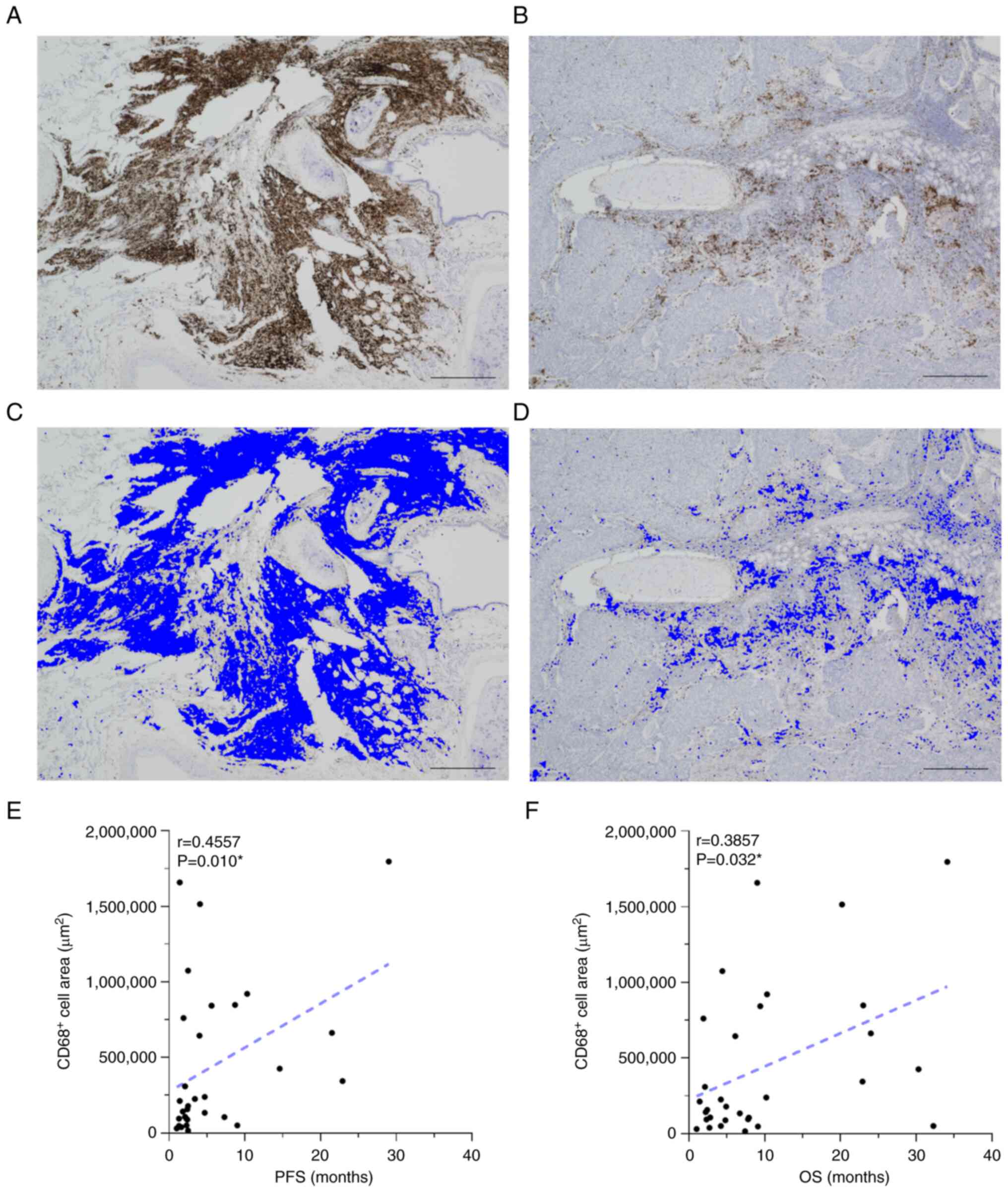|
1
|
Dosset M, Vargas TR, Lagrange A, Boidot R,
Végran F, Roussey A, Chalmin F, Dondaine L, Paul C, Lauret
Marie-Joseph E, et al: PD-1/PD-L1 pathway: An adaptive immune
resistance mechanism to immunogenic chemotherapy in colorectal
cancer. Oncoimmunology. 7:e14339812018. View Article : Google Scholar : PubMed/NCBI
|
|
2
|
Han Y, Liu D and Li L: PD-1/PD-L1 pathway:
Current researches in cancer. Am J Cancer Res. 10:727–742.
2020.PubMed/NCBI
|
|
3
|
Vaddepally RK, Kharel P, Pandey R, Garje R
and Chandra AB: Review of indications of FDA-approved immune
checkpoint inhibitors per NCCN guidelines with the level of
evidence. Cancers (Basel). 12:7382020. View Article : Google Scholar : PubMed/NCBI
|
|
4
|
Gong J, Chehrazi-Raffle A, Reddi S and
Salgia R: Development of PD-1 and PD-L1 inhibitors as a form of
cancer immunotherapy: A comprehensive review of registration trials
and future considerations. J Immunother Cancer. 6:82018. View Article : Google Scholar : PubMed/NCBI
|
|
5
|
Yi M, Niu M, Xu L, Luo S and Wu K:
Regulation of PD-L1 expression in the tumor microenvironment. J
Hematol Oncol. 14:102021. View Article : Google Scholar : PubMed/NCBI
|
|
6
|
Bardhan K, Anagnostou T and Boussiotis VA:
The PD1:PD-L1/2 pathway from discovery to clinical implementation.
Front Immunol. 7:5502016. View Article : Google Scholar : PubMed/NCBI
|
|
7
|
De Marchi P, Leal LF, Duval da Silva V, da
Silva ECA, Cordeiro de Lima VC and Reis RM: PD-L1 expression by
tumor proportion score (TPS) and combined positive score (CPS) are
similar in non-small cell lung cancer (NSCLC). J Clin Pathol.
74:735–740. 2021. View Article : Google Scholar : PubMed/NCBI
|
|
8
|
Kulangara K, Zhang N, Corigliano E,
Guerrero L, Waldroup S, Jaiswal D, Ms MJ, Shah S, Hanks D, Wang J,
et al: Clinical utility of the combined positive score for
programmed death ligand-1 expression and the approval of
pembrolizumab for treatment of gastric cancer. Arch Pathol Lab Med.
143:330–337. 2019. View Article : Google Scholar : PubMed/NCBI
|
|
9
|
Noske A, Wagner DC, Schwamborn K, Foersch
S, Steiger K, Kiechle M, Oettler D, Karapetyan S, Hapfelmeier A,
Roth W and Weichert W: Interassay and interobserver comparability
study of four programmed death-ligand 1 (PD-L1)
immunohistochemistry assays in triple-negative breast cancer.
Breast. 60:238–244. 2021. View Article : Google Scholar : PubMed/NCBI
|
|
10
|
Daud AI, Wolchok JD, Robert C, Hwu WJ,
Weber JS, Ribas A, Hodi FS, Joshua AM, Kefford R, Hersey P, et al:
Programmed death-ligand 1 expression and response to the
anti-programmed death 1 antibody pembrolizumab in melanoma. J Clin
Oncol. 34:4102–4109. 2016. View Article : Google Scholar : PubMed/NCBI
|
|
11
|
Zeng Z, Yang B and Liao Z: Biomarkers in
immunotherapy-based precision treatments of digestive system
tumors. Front Oncol. 11:6504812021. View Article : Google Scholar : PubMed/NCBI
|
|
12
|
Hutarew G: PD-L1 testing, fit for routine
evaluation? From a pathologist's point of view. Memo. 9:201–206.
2016. View Article : Google Scholar : PubMed/NCBI
|
|
13
|
Hirsch FR, McElhinny A, Stanforth D,
Ranger-Moore J, Jansson M, Kulangara K, Richardson W, Towne P,
Hanks D, Vennapusa B, et al: PD-L1 immunohistochemistry assays for
lung cancer: Results from phase 1 of the blueprint PD-L1 IHC assay
comparison project. J Thorac Oncol. 12:208–222. 2017. View Article : Google Scholar : PubMed/NCBI
|
|
14
|
Ohkuma R, Ieguchi K, Watanabe M,
Takayanagi D, Goshima T, Onoue R, Hamada K, Kubota Y, Horiike A,
Ishiguro T, et al: Increased plasma soluble PD-1 concentration
correlates with disease progression in patients with cancer treated
with anti-PD-1 antibodies. Biomedicines. 9:19292021. View Article : Google Scholar : PubMed/NCBI
|
|
15
|
Ando K, Hamada K, Watanabe M, Ohkuma R,
Shida M, Onoue R, Kubota Y, Matsui H, Ishiguro T, Hirasawa Y, et
al: Plasma levels of soluble PD-L1 correlate with tumor regression
in patients with lung and gastric cancer treated with immune
checkpoint inhibitors. Anticancer Res. 39:5195–5201. 2019.
View Article : Google Scholar : PubMed/NCBI
|
|
16
|
Ando K, Hamada K, Shida M, Ohkuma R,
Kubota Y, Horiike A, Matsui H, Ishiguro T, Hirasawa Y, Ariizumi H,
et al: A high number of PD-L1+ CD14+
monocytes in peripheral blood is correlated with shorter survival
in patients receiving immune checkpoint inhibitors. Cancer Immunol
Immunother. 70:337–348. 2021. View Article : Google Scholar : PubMed/NCBI
|
|
17
|
Ziegler-Heitbrock L, Ancuta P, Crowe S,
Dalod M, Grau V, Hart DN, Leenen PJ, Liu YJ, MacPherson G, Randolph
GJ, et al: Nomenclature of monocytes and dendritic cells in blood.
Blood. 116:e74–e80. 2010. View Article : Google Scholar : PubMed/NCBI
|
|
18
|
Wong KL, Yeap WH, Tai JJ, Ong SM, Dang TM
and Wong SC: The three human monocyte subsets: Implications for
health and disease. Immunol Res. 53:41–57. 2012. View Article : Google Scholar : PubMed/NCBI
|
|
19
|
Sidibe A, Ropraz P, Jemelin S, Emre Y,
Poittevin M, Pocard M, Bradfield PF and Imhof BA: Angiogenic
factor-driven inflammation promotes extravasation of human
proangiogenic monocytes to tumours. Nat Commun. 9:3552018.
View Article : Google Scholar : PubMed/NCBI
|
|
20
|
Eisenhauer EA, Therasse P, Bogaerts J,
Schwartz LH, Sargent D, Ford R, Dancey J, Arbuck S, Gwyther S,
Mooney M, et al: New response evaluation criteria in solid tumours:
Revised RECIST guideline (version 1.1). Eur J Cancer. 45:228–247.
2009. View Article : Google Scholar : PubMed/NCBI
|
|
21
|
Borghaei H, Paz-Ares L, Horn L, Spigel DR,
Steins M, Ready NE, Chow LQ, Vokes EE, Felip E, Holgado E, et al:
Nivolumab versus docetaxel in advanced nonsquamous non-small-cell
lung cancer. N Engl J Med. 373:1627–1639. 2015. View Article : Google Scholar : PubMed/NCBI
|
|
22
|
Reck M, Rodríguez-Abreu D, Robinson AG,
Hui R, Csőszi T, Fülöp A, Gottfried M, Peled N, Tafreshi A, Cuffe
S, et al: Pembrolizumab versus chemotherapy for PD-L1-positive
non-small-cell lung cancer. N Engl J Med. 375:1823–1833. 2016.
View Article : Google Scholar : PubMed/NCBI
|
|
23
|
Iida Y, Tanaka H, Sano H, Suzuki Y,
Shimizu H and Urano T: Ectopic expression of PCSK9 by smooth muscle
cells contributes to aortic dissection. Ann Vasc Surg. 48:195–203.
2018. View Article : Google Scholar : PubMed/NCBI
|
|
24
|
Prat M, Le Naour A, Coulson K, Lemée F,
Leray H, Jacquemin G, Rahabi MC, Lemaitre L, Authier H, Ferron G,
et al: Circulating CD14high CD16low
intermediate blood monocytes as a biomarker of ascites immune
status and ovarian cancer progression. J Immunother Cancer.
8:e0004722020. View Article : Google Scholar : PubMed/NCBI
|
|
25
|
Olingy CE, Dinh HQ and Hedrick CC:
Monocyte heterogeneity and functions in cancer. J Leukoc Biol.
106:309–322. 2019. View Article : Google Scholar : PubMed/NCBI
|
|
26
|
Qian BZ, Li J, Zhang H, Kitamura T, Zhang
J, Campion LR, Kaiser EA, Snyder LA and Pollard JW: CCL2 recruits
inflammatory monocytes to facilitate breast-tumour metastasis.
Nature. 475:222–225. 2011. View Article : Google Scholar : PubMed/NCBI
|
|
27
|
Shigeta K, Kosaka T, Kitano S, Yasumizu Y,
Miyazaki Y, Mizuno R, Shinojima T, Kikuchi E, Miyajima A, Tanoguchi
H, et al: High absolute monocyte count predicts poor clinical
outcome in patients with castration-resistant prostate cancer
treated with docetaxel chemotherapy. Ann Surg Oncol. 23:4115–4122.
2016. View Article : Google Scholar : PubMed/NCBI
|
|
28
|
Xu H, Manivannan A, Crane I, Dawson R and
Liversidge J: Critical but divergent roles for CD62L and CD44 in
directing blood monocyte trafficking in vivo during inflammation.
Blood. 112:1166–1174. 2008. View Article : Google Scholar : PubMed/NCBI
|
|
29
|
Movahedi K, Laoui D, Gysemans C, Baeten M,
Stangé G, Van den Bossche J, Mack M, Pipeleers D, In't Veld P, De
Baetselier P and Van Ginderachter JA: Different tumor
microenvironments contain functionally distinct subsets of
macrophages derived from Ly6C(high) monocytes. Cancer Res.
70:5728–5739. 2010. View Article : Google Scholar : PubMed/NCBI
|
|
30
|
Robinson A, Han CZ, Glass CK and Pollard
JW: Monocyte regulation in homeostasis and malignancy. Trends
Immunol. 42:104–119. 2021. View Article : Google Scholar : PubMed/NCBI
|
|
31
|
Tarique AA, Logan J, Thomas E, Holt PG,
Sly PD and Fantino E: Phenotypic, functional, and plasticity
features of classical and alternatively activated human
macrophages. Am J Respir Cell Mol Biol. 53:676–688. 2015.
View Article : Google Scholar : PubMed/NCBI
|
|
32
|
Richards DM, Hettinger J and Feuerer M:
Monocytes and macrophages in cancer: Development and functions.
Cancer Microenviron. 6:179–191. 2013. View Article : Google Scholar : PubMed/NCBI
|
|
33
|
Italiani P and Boraschi D: From monocytes
to M1/M2 macrophages: Phenotypical vs functional differentiation.
Front Immunol. 5:5142014. View Article : Google Scholar : PubMed/NCBI
|
|
34
|
Gomez Perdiguero E, Klapproth K, Schulz C,
Busch K, Azzoni E, Crozet L, Garner H, Trouillet C, de Bruijn MF,
Geissmann F and Rodewald HR: Tissue-resident macrophages originate
from yolk-sac-derived erythro-myeloid progenitors. Nature.
518:547–551. 2015. View Article : Google Scholar : PubMed/NCBI
|
|
35
|
Allavena P, Sica A, Garlanda C and
Mantovani A: The Yin-Yang of tumor-associated macrophages in
neoplastic progression and immune surveillance. Immunol Rev.
222:155–161. 2008. View Article : Google Scholar : PubMed/NCBI
|
|
36
|
Xu Q, Liu H, Qile M and Wuren T: Dynamic
changes in myeloid-derived suppressor cells during the menstrual
cycle: A pilot study. Front Med (Lausanne). 9:9405542022.
View Article : Google Scholar : PubMed/NCBI
|
|
37
|
Nonaka K, Saio M, Umemura N, Kikuchi A,
Takahashi T, Osada S and Yoshida K: Th1 polarization in the tumor
microenvironment upregulates the myeloid-derived suppressor-like
function of macrophages. Cell Immunol. 369:1044372021. View Article : Google Scholar : PubMed/NCBI
|
|
38
|
Trikha P and Carson WE III: Signaling
pathways involved in MDSC regulation. Biochim Biophys Acta.
1846:55–65. 2014.PubMed/NCBI
|
|
39
|
Marvel D and Gabrilovich DI:
Myeloid-derived suppressor cells in the tumor microenvironment:
Expect the unexpected. Clin Invest. 125:3356–3364. 2015. View Article : Google Scholar : PubMed/NCBI
|
|
40
|
Pogoda K, Pyszniak M, Rybojad P and
Tabarkiewicz J: Monocytic myeloid-derived suppressor cells as a
potent suppressor of tumor immunity in non-small cell lung cancer.
Oncol Lett. 12:4785–4794. 2016. View Article : Google Scholar : PubMed/NCBI
|
|
41
|
Koh J, Kim Y, Lee KY, Hur JY, Kim MS, Kim
B, Cho HJ, Lee YC, Bae YH, Ku BM, et al: MDSC subtypes and CD39
expression on CD8+ T cells predict the efficacy of anti-PD-1
immunotherapy in patients with advanced NSCLC. Eur J Immunol.
50:1810–1819. 2020. View Article : Google Scholar : PubMed/NCBI
|
|
42
|
Broute G, Petracci E, De Matteis S, Canale
M, Zampiva I, Priano I, Cravero P, Andrikou K, Burgio MA, Ulivi P,
et al: High levels of circulating monocytic myeloid-derived
suppressive-like cells are associated with the primary resistance
to immune checkpoint inhibitors in advanced non-small cell lung
cancer: An exploratory analysis. Front Immunol. 13:8665612022.
View Article : Google Scholar : PubMed/NCBI
|
|
43
|
Feng J, Chen S, Li S, Wu B, Lu J, Tan L,
Li J, Song Y, Shi G, Shi YG and Jiang J: The association between
monocytic myeloid-derived suppressor cells levels and the
anti-tumor efficacy of anti-PD-1 therapy in NSCLC patients. Transl
Oncol. 13:1008652020. View Article : Google Scholar : PubMed/NCBI
|
|
44
|
Sasaki A, Iwashita Y, Shibata K, Matsumoto
T, Ohta M and Kitano S: Prognostic value of preoperative peripheral
blood monocyte count in patients with hepatocellular carcinoma.
Surgery. 139:755–764. 2006. View Article : Google Scholar : PubMed/NCBI
|
|
45
|
Lee YY, Choi CH, Sung CO, Do IG, Huh S,
Song T, Kim MK, Kim HJ, Kim TJ, Lee JW, et al: Prognostic value of
pre-treatment circulating monocyte count in patients with cervical
cancer: Comparison with SCC-Ag level. Gynecol Oncol. 124:92–97.
2012. View Article : Google Scholar : PubMed/NCBI
|
|
46
|
Sanford DE, Belt BA, Panni RZ, Mayer A,
Deshpande AD, Carpenter D, Mitchem JB, Plambeck-Suess SM, Worley
LA, Goetz BD, et al: Inflammatory monocyte mobilization decreases
patient survival in pancreatic cancer: A role for targeting the
CCL2/CCR2 axis. Clin Cancer Res. 19:3404–3415. 2013. View Article : Google Scholar : PubMed/NCBI
|
|
47
|
Hayashi T, Fujita K, Nojima S, Hayashi Y,
Nakano K, Ishizuya Y, Wang C, Yamamoto Y, Kinouchi T, Matsuzaki K,
et al: Peripheral blood monocyte count reflecting
tumor-infiltrating macrophages is a predictive factor of adverse
pathology in radical prostatectomy specimens. Prostate.
77:1383–1388. 2017. View Article : Google Scholar : PubMed/NCBI
|
|
48
|
Feng F, Zheng G, Wang Q, Liu S, Liu Z, Xu
G, Wang F, Guo M, Lian X and Zhang H: Low lymphocyte count and high
monocyte count predicts poor prognosis of gastric cancer. BMC
Gastroenterol. 18:1482018. View Article : Google Scholar : PubMed/NCBI
|
|
49
|
Parikh K, Kumar A, Ahmed J, Anwar A,
Puccio C, Chun H, Fanucchi M and Lim SH: Peripheral monocytes and
neutrophils predict response to immune checkpoint inhibitors in
patients with metastatic non-small cell lung cancer. Cancer Immunol
Immunother. 67:1365–1370. 2018. View Article : Google Scholar : PubMed/NCBI
|
|
50
|
Yasuoka H, Asai A, Ohama H, Tsuchimoto Y,
Fukunishi S and Higuchi K: Increased both PD-L1 and PD-L2
expressions on monocytes of patients with hepatocellular carcinoma
was associated with a poor prognosis. Sci Rep. 10:103772020.
View Article : Google Scholar : PubMed/NCBI
|
|
51
|
Riemann D, Schütte W, Turzer S, Seliger B
and Möller M: High PD-L1/CD274 expression of monocytes and blood
dendritic cells is a risk factor in lung cancer patients undergoing
treatment with PD1 inhibitor therapy. Cancers (Basel). 12:29662020.
View Article : Google Scholar : PubMed/NCBI
|
|
52
|
Zhang W, Liu Y, Yan Z, Yang H, Sun W, Yao
Y, Chen Y and Jiang R: IL-6 promotes PD-L1 expression in monocytes
and macrophages by decreasing protein tyrosine phosphatase receptor
type O expression in human hepatocellular carcinoma. J Immunother
Cancer. 8:e0002852020. View Article : Google Scholar : PubMed/NCBI
|
|
53
|
Jeon SH, Lee YJ, Kim HD, Nam H, Ryoo BY,
Park SH, Yoo C and Shin EC: Dynamic changes in peripheral blood
monocytes early after anti-PD-1 therapy predict clinical outcomes
in hepatocellular carcinoma. Cancer Immunol Immunother. 28:371–384.
2023. View Article : Google Scholar : PubMed/NCBI
|
|
54
|
Bianchini M, Duchêne J, Santovito D,
Schloss MJ, Evrard M, Winkels H, Aslani M, Mohanta SK, Horckmans M,
Blanchet X, et al: PD-L1 expression on nonclassical monocytes
reveals their origin and immunoregulatory function. Sci Immunol.
4:eaar30542019. View Article : Google Scholar : PubMed/NCBI
|
|
55
|
Noman MZ and Chouaib S: Targeting hypoxia
at the forefront of anticancer immune responses. Oncoimmunology.
3:e9544632015. View Article : Google Scholar : PubMed/NCBI
|
|
56
|
Reck M, Kerr KM, Grohé C, Manegold C,
Pavlakis N, Paz-Ares L, Huber RM, Popat S, Thatcher N, Park K, et
al: Defining aggressive or early progressing nononcogene-addicted
non-small-cell lung cancer: A separate disease entity? Future
Oncol. 15:1363–1383. 2019. View Article : Google Scholar : PubMed/NCBI
|
|
57
|
Shen X and Zhao B: Efficacy of PD-1 or
PD-L1 inhibitors and PD-L1 expression status in cancer:
Meta-analysis. BMJ. 362:k35292018. View Article : Google Scholar : PubMed/NCBI
|















